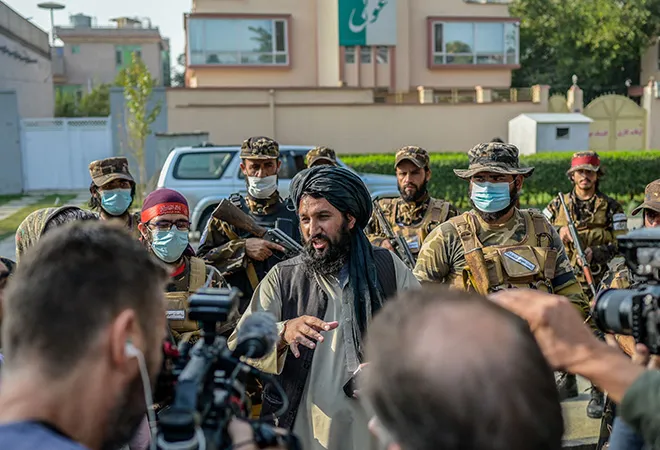-
CENTRES
Progammes & Centres
Location
Now that the “War on Terror” has concluded, India needs to define its role in the South Asian Region and attempt to engage with all possible partners, including China and Russia

A ‘good war’ has ended badly. President Biden has been criticised for the messy withdrawal, yet it has to be admitted that pulling out from an ‘unwinnable war’, which had no defined or limited goal, has to be messy. Those who remember the withdrawal of the US forces from Vietnam would certainly agree, although that withdrawal happened after years of peace negotiations with North Vietnam.
Historians will certainly have the opportunity of dissecting how Donald Rumsfeld’s thoughtless “Mission accomplished” declaration of early 2003 turned into a ‘forever war’, through lost opportunities of accommodating the Taliban on acceptable terms combined with a dogged refusal to admit the fragility of the Afghan government and Afghan national army. This was further exacerbated by a lack of understanding of Afghan national culture, paralysing inaction on Pakistan’s duplicitous role, the unpopularity of the Afghan government due to widespread and deep-rooted corruption, amidst many other issues. From 2006 onwards, the Taliban started its onslaught and began capturing provinces in the south and in the east of Afghanistan. Despite being much larger, the Afghan national army was no match for the Taliban, since it lacked any motivation to fight a war initiated by a foreign power.
While presidents following George W Bush wished to get out of an ‘unsustainable war’ in Afghanistan, the ‘War on Terror’ dragged on to become an admittedly unwinnable anti-insurgency campaign under their watch. The writing was on the wall. Even the majority of the American public (55 percent), as far back as 2010, according to a CNN/Opinion Research poll, opposed the war. By 2019, according to “Afghanistan Papers” published by the Washington Post, many US officials had concluded that the war was unwinnable. The US public appeared more realistic in considering the virtual ending of the war with Osama bin Laden’s capture and death. Expectedly, a Pew Research survey of US adults conducted in August this year, found that a majority (54 percent) viewed the withdrawal of US forces as the “right decision”.
The Taliban started its onslaught and began capturing provinces in the south and in the east of Afghanistan. Despite being much larger, the Afghan national army was no match for the Taliban, since it lacked any motivation to fight a war initiated by a foreign power.
Thus, it was unnecessary to console oneself by saying that the winning Taliban forces would wait at the gates of Kabul for a negotiated settlement with the Afghan government. Although the Pew survey found a whopping majority, nearly 70 percent, felt that the US “failed” in achieving its goals in Afghanistan; in fact, only time will tell whether 20 years of US involvement in Afghanistan has not been entirely useless. The rise of educated and conscious women in Afghanistan is sure evidence of that. There has also emerged an Afghan civil society which is slowly but surely making an impact on Taliban 2.0. The world will need to closely observe whether the immediate steps of the new Taliban government towards capping these developments will stay on in the coming months or not. .
Undoubtedly, the development in Afghanistan is not good news for India. But there was no dearth of evidence of its coming. Joe Biden, as the Democratic party candidate for the US Presidency, in a speech in 2019, had put it very clearly, “It is past time to end the forever wars, which have cost the United States untold blood and treasure.” His priorities were delineated as he focused more on strengthening democracy at home, prioritising issues of climate change and global health, and getting ‘tough with China’.
Surely, the developments in Afghanistan will put pressure on the security environment of South Asia. India will have to look at it in the context of its relations with Pakistan and the Chinese build up on its borders. India also has to keep in mind that while it has adopted a “wait and watch” policy with regard to Taliban 2.0, both Russia and China readily expressed their willingness to do business with it. Thus, if different countries in the region have expressed or are expressing their stance towards Taliban government, Taliban is yet to spell out their policies towards their neighbours.
The developments in Afghanistan will put pressure on the security environment of South Asia. India will have to look at it in the context of its relations with Pakistan and the Chinese build up on its borders.
It has to be noted that the US’ dependability when it comes to fulfilling its commitments has taken a hit in Afghanistan. And it can hardly be denied that, to an extent, the recently concluded AUKUS (Australia-United Kingdom-United States) has taken the sheen off the QUAD (Quadrilateral Security Dialogue). While AUKUS is a trilateral security pact designed to counter China in the Indo-Pacific, the QUAD—despite the word ‘security’ in its middle—is being seen as an informal arrangement amongst four democracies for promoting global good, which remains a rather vague concept. This was not addressed in the recent QUAD summit at the White House either as President Biden termed it as a coming together of democratic partners “to take on key challenges from COVID to climate to emerging technologies.”
This dynamic situation in South Asia and in the Indo-Pacific places India in an unenviable position, demanding a lot of strategic rethinking on its end. As John Maynard Keynes had warned, since we cannot change facts, we need to re-conceptualise our view of them. And George Kennan had famously advised policymakers that “a resolute and courageous liquidation of unsound positions” is more respectful than stubbornly pursuing “extravagant or unpromising objectives.”
Dynamic situation in South Asia and in the Indo-Pacific places India in an unenviable position, demanding a lot of strategic rethinking on its end.
The 21st century has seen a growing multidimensional relationship between India and the United States. India can expect much from Biden’s commitment to ‘repair and reinvigorate’ democracy at home as much as to ‘strengthen the coalition of democracies’ abroad. While India’s defence, trade, and people-to-people relationship with the US are strong and increasing, it is necessary to remember that at the bottom of our relations are our shared democratic values, tolerance, and societal diversity. These help India stand as an exemplar in the world, and more so in South Asia. India needs to strengthen these by dismantling all discriminatory enactments, promoting toleration of diversity of choices in everyday life and standing firmly on equal treatment of caste and religious groups.
While the US remains singularly important for India, it is also necessary that India must look around in the close neighbourhood. India had a robust relationship with Russia during the Soviet era and to a large extent, beyond that. But this relationship over the years has weakened to become primarily a ‘buyer-seller’ relation in the economic front and a declining defence relationship. Experts opine that India-Russia trade in recent times is much below its potential. Similarly, Russian arms sales to India declined from 79 percent between 2008 and 2012 to 62 percent between 2013 and 2018. Of course, in 2018, India decided to buy S-400 surface-to-air missile defence system from Russia defying the US CAATSA Act despite US threats of sanctions. That was a good example of India’s determination to repair and improve relations with Russia.
While India must remain prepared to take on China on the border issue, it could explore areas of cooperation like climate and terrorism. It is indeed true that the QUAD or AUKUS would likely have been unnecessary had China not adopted a very expansive role in the Indo-Pacific.
It is unfortunate that US-Russia relations during the past two decades has become acutely conflictual, the reasons for which are very inarticulate and opaque. India may even try to help repair that relationship, which would augur well for the world as well as for this region. Similarly, while India must remain prepared to take on China on the border issue, it could explore areas of cooperation like climate and terrorism. It is indeed true that the QUAD or AUKUS would likely have been unnecessary had China not adopted a very expansive role in the Indo-Pacific. Yet, India’s policy cannot be based on the assumption of an all-round conflict with China.
India has a lot more weight than any of its South Asian neighbours. It is necessary to bring that weight to bear on our negotiations to reinvigorate our relations with Russia and China.
The views expressed above belong to the author(s). ORF research and analyses now available on Telegram! Click here to access our curated content — blogs, longforms and interviews.

Amlan Bibhudatta hails from Odisha and currently works at CEEW Centre for Energy Finance as a Research Analyst. He holds a BA in economics from ...
Read More +